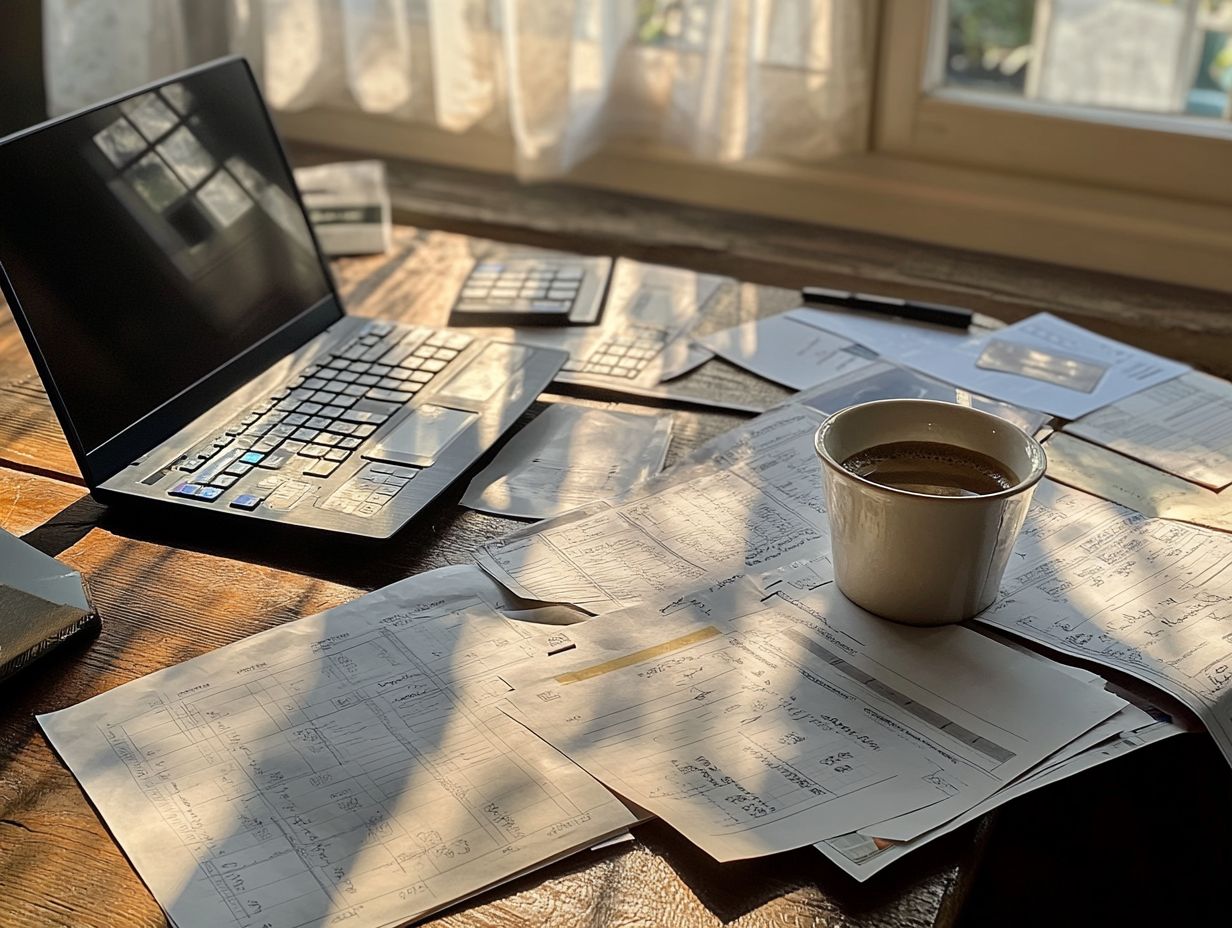The Freelancer’s Guide to Budgeting for Business Expenses
Budgeting is an essential skill for freelancers, as it enables them to navigate the unpredictable nature of self-employment. Given the variable income and diverse business expenses, effective money management is crucial for freelancers to withstand fluctuations in cash flow.
This guide on budgeting for freelancers outlines how to identify common expenses, create a personal budget, and track spending. Additionally, it discusses strategies for maximizing tax deductions, planning for unexpected costs, and implementing cost-saving measures to ensure financial management.
Contents
- Key Takeaways:
- Why Budgeting is Important for Freelancers
- Identifying Business Expenses
- Creating a Budget for Business Expenses
- Tracking and Managing Expenses
- Maximizing Tax Deductions
- Planning for Unexpected Expenses
- Tips for Reducing Business Expenses
- Frequently Asked Questions
- What are the essential business expenses that a freelancer needs to budget for?
- How can a freelancer create a budget for their business expenses?
- What are some tips for cutting down on business expenses as a freelancer?
- Should freelancers set aside money for unexpected business expenses?
- How can a freelancer track their business expenses?
- What are some common mistakes freelancers make when budgeting for business expenses and how can they be avoided?
Key Takeaways:
- Budgeting is crucial for freelancers as it helps identify and track business expenses.
- Set a realistic budget by accurately estimating expenses and utilizing tools for expense tracking and maximizing tax deductions.
- Plan for unexpected expenses by creating an emergency fund and implementing cost-saving strategies to reduce business expenses.
Why Budgeting is Important for Freelancers
Budgeting is crucial for freelancers like Susan Johnston Taylor, as it helps manage unpredictable income streams and ensures that financial goals are met. Freelancers work on different client projects, leading to fluctuating income. Effective budgeting enables them to track their expenses accurately and allocate funds for essential areas, such as retirement contributions and emergency savings.
Budgeting helps freelancers understand their average income over time, which aids in forecasting business and personal spending.
Identifying Business Expenses
Identifying business expenses is crucial for freelancers to maintain their financial health and ensure that all deductible expenses are accurately recorded for tax purposes, particularly for those filing 1099 taxes, which are tax forms for self-employed individuals, such as Freelancers Union members.
Recognizing costs related to client projects, office supplies, and home office deductions are essential components of tracking business expenses. These significantly impact overall financial management and the establishment of an emergency fund.
Common Expenses for Freelancers
Common costs for freelancers include expenses related to client projects, home office setup, and various deductible items essential for business operations, such as health insurance and retirement contributions through SEP IRA or SIMPLE IRA. Understanding these costs is crucial, especially when preparing for 1099 taxes at the end of the financial year. In addition to these basic expenses, freelancers encounter several other costs.
- Software: Subscriptions to software platforms represent significant operational costs for freelancers. For instance, many graphic designers rely on Adobe Creative Cloud for their projects. Similar subscriptions are available for project management, invoicing, and accounting platforms.
- Office Supplies: Beyond creating a comfortable workspace, freelancers typically need to invest in office supplies like paper and pens. Some specialists may also require additional tools, such as printers or ergonomic chairs, to enhance their home office setups.
- Travel: If you’re traveling for work, don’t forget to track those expenses—every penny counts when tax season arrives! Freelancers who travel for networking events, client meetings, or exhibitions must consider expenses such as airfare, hotel accommodations, and meals, which are often tax-deductible.
By monitoring these various costs, freelancers can stay within budget and maximize their deductions during tax season.
Creating a Budget for Business Expenses
Creating a budget is not just a chore—it’s your roadmap to financial success! Creating a budget for business expenses is a crucial step for freelancers aiming to achieve financial sustainability and growth. It helps align spending with financial goals and enables more effective tracking of profit and loss.
By establishing a personal budget that considers both variable and fixed expenses, freelancers can utilize software tools like QuickBooks and FreshBooks to simplify the budgeting process and maintain clarity regarding their overall financial well-being as they plan for 2024.
Steps for Setting a Realistic Budget
Setting a realistic budget involves several key steps, including assessing expected monthly income and estimating business expenses. Establishing a system for tracking expenses is essential for effective money management.
Freelancers should begin by evaluating their average monthly income and adjusting it to account for expected fluctuations. This allows them to plan for both anticipated and unforeseen costs.
To create a more detailed budget, they should categorize their expenses into fixed costs, such as rent, utilities, and groceries, and variable costs, including entertainment and discretionary spending.
It’s also important to allocate a portion of their income for an emergency fund, ideally covering three to six months of living expenses.
Budgeting apps can be invaluable in this process. They automate the tracking of income and expenses while providing insights into spending patterns.
Regularly reviewing and adjusting the budget is crucial. This ensures it accurately reflects current financial circumstances, making it an effective tool for achieving financial goals.
Tracking and Managing Expenses
Tracking and managing expenses is crucial for freelancers to maintain control over their finances. This ensures that all expense claims are properly documented, especially during tax season.
Software tools such as Wave and Excel can assist freelancers in tracking business expenses. They help categorize them and monitor financial health throughout the year.
Tools and Strategies for Expense Tracking
Freelancers can benefit from a variety of effective tools and strategies for expense tracking. Popular software like QuickBooks and FreshBooks can significantly alleviate the burden of financial management by automating the tracking process.
These tools typically offer features that help freelancers categorize their expenses and generate reports. Staying organized during tax season becomes easier, which simplifies managing expense claims.
By exploring a wide range of software tools, users can discover distinct features that cater to their specific needs. Some applications provide mobile access for on-the-go expense tracking.
Others focus on integrating with bank accounts to automatically import transactions. A comparison of these tools reveals a spectrum that includes free options and premium products offering advanced analytics.
Implementing useful strategies, such as setting up recurring expense categories and regularly reviewing financial reports, enhances clarity in expense tracking. Using budgeting apps and cloud storage for documents helps freelancers keep expenses organized.
Maximizing Tax Deductions
Maximizing tax deductions is crucial for freelancers looking to reduce their tax liability. This is particularly important when filing 1099 taxes and managing their tax return.
Make sure you track all deductible expenses throughout the year, especially when preparing your tax return. Understanding which expenses can be deducted, such as home office costs, income sources, and retirement contributions, helps freelancers lower their taxable income.
Start managing your money effectively today—your future self will thank you!
Summary: Setting a realistic budget, tracking expenses diligently, and maximizing tax deductions are critical for freelancers. By implementing these strategies, you can take control of your finances and work towards your financial goals.
Expenses That Can Be Deducted on Taxes
Freelancers can deduct a wide range of expenses on their taxes, including office supplies, travel costs, and contributions to retirement accounts such as SEP IRAs (Simplified Employee Pension Individual Retirement Accounts) or SIMPLE IRAs (Savings Incentive Match Plan for Employees). Understanding these deductions is essential for effective financial management.
It is also important for ensuring compliance with 1099 tax requirements. For example, expenses related to home office space, internet service, and software subscriptions can significantly lower taxable income. Freelancers should be diligent about retaining all invoices and receipts, as maintaining detailed records is crucial during audits.
Don’t forget to consider other potential deductions, such as marketing expenses, professional development courses, or fees from platforms like Fiverr. These can further enhance a business’s financial health. By meticulously tracking these expenses and staying organized, freelancers can effectively reduce their tax burden while promoting a sustainable professional trajectory.
Planning for Unexpected Expenses
Freelancers should prepare for unexpected expenses to minimize financial risk and ensure they can cover unforeseen costs without jeopardizing their financial goals. By establishing an emergency fund sufficient to cover several months’ worth of business expenses, freelancers create a buffer that helps them navigate economic downturns.
Emergency Fund and Backup Planning
An emergency fund serves as a crucial component of backup planning for freelancers, providing a financial buffer to cover unexpected business expenses and emergencies that may arise without warning. By setting aside a portion of their income each month, freelancers can work toward their financial goals.
This fund creates a safety net, enabling a more relaxed approach to financial management. Aim for a minimum of three to six months’ worth of living expenses, as this can offer significant protection against unforeseen events, such as late-paying clients or personal illness.
Incorporating this fund into an overall budgeting strategy fosters responsible spending habits among freelancers. It encourages them to allocate funds they might otherwise spend, contributing to a sense of security.
This security can enhance productivity and reduce stress associated with financial uncertainty.
Tips for Reducing Business Expenses
Reducing business costs is a top priority for freelancers. Doing so enhances profit margins and facilitates better financial management across multiple client projects.
Implementing cost-cutting strategies enables freelancers to identify unnecessary expenditures and utilize resources more effectively. Ultimately, this benefits their bottom line.
Cost-Saving Strategies for Freelancers
Cost-saving strategies can significantly enhance financial management by helping freelancers optimize spending and reduce unnecessary business expenses.
Examples of these strategies include:
- Utilizing free software tools
- Collaborating with other freelancers
- Negotiating with suppliers to lower costs
Additionally, taking advantage of tax deductions available to freelancers, such as home office expenses and business-related travel, can improve financial efficiency. Practices like budgeting and expense tracking through user-friendly apps can further assist freelancers in managing their finances effectively.
By adopting these strategies, freelancers can save money while paving the way for more sustainable financial health. These approaches also encourage freelancers to reinvest their savings back into their businesses or strengthen their personal financial buffers.
This enables them to better withstand unexpected challenges in the gig economy.
Frequently Asked Questions
What are the essential business expenses that a freelancer needs to budget for?
As a freelancer, you need to budget for expenses such as office supplies, marketing and advertising costs, professional development, taxes, insurance, and technology and software expenses.
How can a freelancer create a budget for their business expenses?
A freelancer can create a budget by estimating their monthly income. Then, list fixed and variable expenses and set aside a part of their income for each expense.
It’s important to regularly review and adjust the budget as needed.
What are some tips for cutting down on business expenses as a freelancer?
Negotiate lower rates with service providers or suppliers. You can also share office space or equipment with other freelancers to save on rent and utilities.
Review your expenses regularly. This helps identify areas to cut costs.
Should freelancers set aside money for unexpected business expenses?
Don’t overlook the need for an emergency fund! Save for unexpected costs like repairs or sudden bills.
Aim to save at least 3-6 months of expenses now to secure your future.
How can a freelancer track their business expenses?
There are several tools and apps available to help freelancers track their business expenses. Some popular options include FreshBooks, QuickBooks, and Expensify.
You can also use spreadsheets or a dedicated business expense tracking notebook.
What are some common mistakes freelancers make when budgeting for business expenses and how can they be avoided?
Common mistakes include underestimating expenses and not regularly reviewing and updating the budget.
It’s also essential to set aside money for taxes and other mandatory expenses. Be realistic and thorough when creating a budget for your business as a freelancer.










